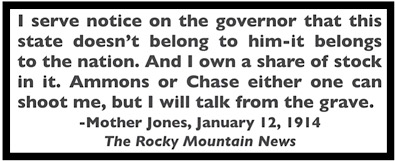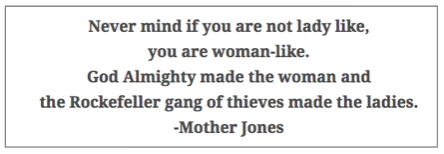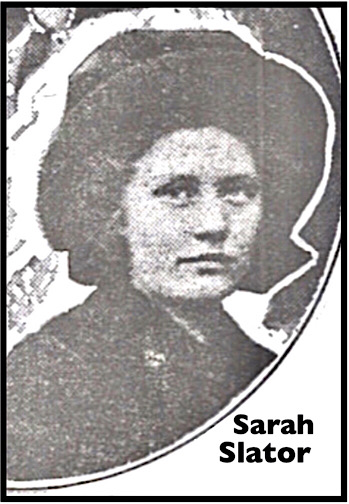 —————
—————
Hellraisers Journal – Sunday March 6, 1904
“The Coal Miners’ Strike in Colorado” by Bertha Howell Mailly
From The Comrade of March 1904:
 —————
—————
Hellraisers Journal – Sunday March 6, 1904
“The Coal Miners’ Strike in Colorado” by Bertha Howell Mailly
From The Comrade of March 1904:
 —————
—————
Hellraisers Journal – Sunday March 1, 1914
Trinidad, Colorado – Mother Jones Still a Military Prisoner, Held Incommunicado
From the International Review of March 1914:
The Latest from Trinidad
INTERNATIONAL SOCIALIST REVIEW,
Chicago, Ill.
Dear Comrades:Replying to yours of Feb. 5, regarding a letter to Mother Jones, I must say it is impossible. She is held absolutely “incommunicado”-no one having seen her since incarceration except Horace Hawkins, attorney for U. M. W. A., and his admission was since the Congressional investigation was approaching. I enclose you clipping from yesterday’s daily showing how even medical advice from outside was denied her. “Military discipline” and general conditions are softening down much since the investigation has become a certainty. This puts new hope and courage into us all.
Yours for Socialism,
GRACE B. MARIANS,
Local Secty., S. P.
Feb. 10, 1914Mother ]ones Parade
On January 22 a women’s parade was formed to make a demonstration protesting against the imprisonment of “Mother Jones.” The line of march was to proceed from Castle Hall up Commercial street, along Main to the postoffice, and then return to Castle Hall. One of the leaders was an Italian woman, who did not speak or understand English well. She was carrying an American flag in the form of a large banner. Not knowing that the parade was to turn at the postoffice, she led the parade towards the hospital where Mother Jones is held. A block from the postoffice the parade was met by a troop of cavalry commanded in person by General Chase. The soldiers immediately pulled the flag out of the woman’s hands. Other women ran up and demanded the return of the flag. This was finally returned to them amidst cheers.
On receiving the flag the paraders re-formed, turned around and started back to the hall. They had not proceeded a block when the troop of cavalry, who had now been reinforced by the infantry, charged at full gallop with drawn sabers. Women were rode down, others flocked to the sidewalks. The cavalry then charged the sidewalks, beating the people with the flat of their swords. One woman received a gash on the hand from the saber stroke. Mrs. Margaret Hammond was struck by a militiaman with his fist, cutting her forehead above the left eye and blackening both eyes. Any person objecting to the treatment was immediately seized and taken to jail.
The infantry backed up the charge with drawn bayonets, forcing the people before them. Private lawns were invaded and any persons standing on them were herded off. Even government property was not sacred. The troops drove people from the postoffice steps.
A number of people were injured in this charge, mostly women, and eighteen were taken to prison. The streets were then blocked by the militia and no person was allowed to pass up or down them without permission of an officer.
Governor Ammons upheld General Chase in his chivalrous attack upon the women of the community.
—————
 —————
—————
Hellraisers Journal – Monday February 23, 1914
Trinidad, Colorado – Mother Jones Gagged and Silenced by Ammons and Chase
From the Seattle Union Record of February 21, 1914:
 —————
—————
Hellraisers Journal – Saturday February 21, 1914
Trinidad, Colorado – Sarah Slator, Age 16, Kicked, Foot Smashed, Jailed
Miss Sarah Slator appeared before the Congressional Investigating Committee February 20th. She is the 16-year-old girl who was kicked in the breast and the shoulder by General Chase just before the brave old soldier order his troops to “Ride Down The Women,” thereby causing the so-called “Mother Jones Riot.” Miss Slator gives a vivid description of the events of that day and relates how she held her own against soldiers on horseback armed with swords, rifle butts and bayonets:

Sarah Slator, a witness produced and sworn before the committee, on oath testified as follows:
Examination by Mr. Brewster [Attorney for the Miners]:
Q. Your name is Sarah Slator ? — A. Yes.
Q. You spell your name S-l-a-y-t-o-r ? — A. S-l-a-t-o-r.
Q. S-l-a-t-o-r?— A. S-l-a-t-o-r.
Q. Where do you live, Miss Slator? — A. At — on 818 East Main
Q. In what city? — A. Trinidad.
Q. Colorado? — A. Colorado; yes, sir.
Q. How old are you? — A. I am 16.
Q. Were you born in Trinidad ? — A. Yes, air.
Q. Is your father living? — A. Yes, sir.
Q. What do you do ? — A. I attend school.
Q. And you have been to school this morning ? — A. Yes, sir.
Q. Just got in ? —A. Yes, sir.
Q. Now, do you remember the parade A. Yes, sir.
Q. The women’s parade? -A. Yes, sir.
Q. Did you see a man known as Gen. Chase on that day? — A. Yes,
Q. Now, begin and tell in your own way where you were when you first saw Gen. Chase, and what happened to you thereafter ?- A. Well, I was in front of Dr. Espey’s place when I first — – —
Q. Dr. Espey’s place is on the corner of what street ? — A. Of Main – and Walnut.
Q. Main and Walnut? As related to the post office, where is it? — A. It is a block east of the post office.
Q. A block east of the post office. That is, this way from the post office? — A. That way [pointing apparently north].
Q. Oh, Espey’s place is beyond the post office? — A. Yes, sir.
Q. I see. Now, tell where you were standing and what happened? — A. I was standing in the middle of the car tracks this side of Espey’s when I first saw Gen. Chase, and he was on horseback: and there was also another officer on horseback, and they were running through the ranks backward and forward, and trying to make the women return toward West Main; and I was standing alone watching the women go ; and then Gen. Chase came up on horseback, and he rushed right by me on his horse, and he said, “Get back there,” and I was somewhat dazed by the horse running up against me, and I stood there, and he kicked me and told me to get back.
Q. Now, where did he kick you? — A. He kicked — his foot went right up this way on me [indicating breast].
Q. Well, go on. — A. And then he told me to go back ; and then the other officer came to him to help him to make me go back.
Q. Wait a minute. It needed two — was this Gen. Chase that you speak of a small man? — A. No, sir.
Q. Is he a pretty large man? — A. Yes, sir.
Q. And it needed another officer to help him — to make you get back? — A. Evidently; because the other officer came up to him.
Q. Well, what happened then ?— A. Well, then a good number of women had passed, and they gave a sort, of a triumphant yell as they passed ; so both the officers turned to attend to the other women, and got past; and then Gen. Chase’s horse became frightened at some thing — I don’t know what it was — and it ran into a horse and buggy that was there, and he fell off the horse.
Q. That is, Gen. Chase fell off the horse ? — A. Yes, sir.
Q. Go ahead. — A. And he had been treating us so mean that everybody screamed and laughed at him, and that made him angry; and he gave the order that they were to “ride down the women.”
Q. What, precisely, were his words? — A. Well, I didn’t hear all of his order, but I heard that — “Ride down the women,” and “Make them get back.” So then the cavalry that were stationed in front of Maoluff’s place — that is a little bit beyond Walnut Street — they commenced to try to get the women to return to Main Street, or to Commercial Street.
Q. By the way, how did you know this was Gen. Chase ? — A. Well, I didn’t
Q. Describe him? — A. I didn’t know him then, but I met him afterwards.
Mr Brewster: Describe him also.Chairman Foster [U. S. Representative, Chairman of Committee]: She needn’t do that.
Q. You met him afterwards ? — A. Yes, sir. So they then came up, and then when they started in I went — stepped on the sidewalk then — I had been in the middle of the street — and then I saw the soldiers take the flag from a woman — I don’t know who the woman was — and that made the women angry, and those that had banners, they tried to hit the militia that had the swords, and I saw several of the hats that the women had that were thrown in the mud in front of Maoluff’s place; and then I stepped up on that little platform in front of the printer’s place there, and of course the horses could not come up on the platform, and we stood there for a few minutes; and then they sent the infantry to make us get off the platform. And after that I attempted to try to go up Walnut Street to return home, and then they ordered me back to Main Street; one of the militia was on horseback — he tried to hit me with his sword.
Q. Now, what happened when he tried to hit you with his sword ? — A. He was just trying to order me back to Main Street, and I was standing there watching him, and he came up and he attempted to hit me with his sword, and I stepped behind a telephone post, and he hit the telephone post instead of me.
Q. Was it a light tap [tapping] ? — A. No ; he hit it pretty hard — if it had hit me. Then I said to him, “Break your sword ; I don’t care,” and he again attempted to hit me, and he hit the telephone post twice after that. And then I went across the street — that is, to the north — southwest corner of Walnut, and I was there met by a militiaman on horseback, who was talking to a woman, and he told them — she asked them what right they had to chase women away like cattle, and he said, “When the women sink beneath our respect, they need to be treated like cattle,” and I asked him how we had “sunk beneath his respect,” and he didn’t answer me. Then I went up Main Street, and I was left alone, practically, until I got to Kuver’s, and when I was in front of Kuver’s there, there was three militiamen came up to me and told me to move on. I had been going at a pretty slow rate; so I went on, and I got in front of the — in front of Zimmerman’s, I saw two militia — I mean four militia, with two women, taking them to prison; and I shamed them for having to take four militia to take two women.
 —————
—————
Hellraisers Journal – Wednesday February 17, 1904
Trinidad, Colorado – Fairly and Mooney Recovering from Violent Attack
From The Rocky Mountain News of February 15, 1904:
From The Arizona Republican of February 15, 1904:
MINE WORKERS ATTACKED
———-
A Violent Strike Episode
Near Trinidad, Colorado.
———-Trinidad, Colo., Feb. 14.-William Fairley and James Mooney, members of the national board of the United Mine Workers, from Alabama and Mississippi, respectively, were waylaid this afternoon on the road between Majestic and Bowen, dragged from their buggy and beaten by eight men with stones and six shooters and left lying in the road.
They were able later to get in the buggy and drive to Bowen. They were then brought to Trinidad. Mooney is in serious condition and had to be taken to a hospital. Fairly is able to go to his hotel. No arrests have yet been made. This is the first time since the coal strike was inaugurated that any officials of the United Mine Workers have been assaulted. It is reported that the men who attacked the miners officials are coal company guards. We have learned from the United Mine Workers’ Headquarters in Indianapolis that Mother Jones was in a wagon which was following the vehicle carrying Fairley and Mooney, but she was not harmed. Mother was recently released from the hospital in Trinidad, after surviving a serious siege of pneumonia.
[Emphasis added.]
 —————
—————
Hellraisers Journal – Monday February 16, 1914
Denver, Colorado – John Lawson Testifies Before House Sub-Committee
From the Denver United Labor Bulletin of February 14, 1914:
From Las Vegas Optic of February 11, 1914:
MILITIA GAVE CONFISCATED ARMS
TO MINE GUARDS, SAYS LABOR LEADERSECRETS OF THE CONVENTION WITHHELD
———-UNION OFFICIAL ASKS COMMITTEE TO EXCUSE HIM
FROM ANSWERING QUERIES
———-
Denver, Colo., Feb. 11-John R. Lawson, Colorado member of the international executive board of the United Mine Workers of America today asked the house investigation committee to excuse him from revealing all the details of the district convention at which the Colorado coal strike was called.
“You gentlemen must remember,” he said, “that this strike is not over yet, and we do not care to reveal anything that might give away our hand to the operators.”
The labor leader was allowed to give such information regarding the convention as he saw fit and was not pressed for union secrets.
Asked by Chairman Foster for his reasons for insisting upon recognition for the unions, the labor leader said:
“There is no basis for settlement between workman and employer. The union prevents strikes and without it few men strike without justification. Then, unorganized workers cannot obtain redress for abuses or change of working conditions. If they make complaint, they are discharge.”
At the opening of this morning’s session of the strike investigation it was announced that Edward Costigan had been added to the list of attorneys for the miners. John R. Lawson was called to the stand to resume his testimony. The Colorado member of the executive board of the United Mine Workers of America told of the arrival of the militia in the strike zone.
“Almost immediately after the arrival of the troops at Trinidad, detachments were stationed at various points in Las Animas and Huerfano counties,” he said.
“When the troops arrived, the leaders of our organizations informed the men on strike that if they were satisfied the militia was going to enforce the laws, not to take part in the labor controversy.”
The witness then told of having informed Adjutant General John Chase that the Baldwin-Felts detectives employed by the operators were importing arms. He said the general ordered a captain to capture the guns which were taken from an express office by the troops.
“Later,” he resumed, “General Chase admitted that this particular shipment of arms, taken from the express office, was distributed to the guards.”
 —————
—————
Hellraisers Journal – Sunday February 15, 1914
“The Capture of Mother Jones” by W. A. Pease
From The Socialist and Labor Star of February 13, 1914:
 —————
—————
Hellraisers Journal – Thursday February 12, 1914
Drawing of Mother Jones by Art Young: “Come On, You Hell-Hounds!”
From The Masses of February 1914:
 —————
—————
Hellraisers Journal – Tuesday February 9, 1904
Trinidad, Colorado – Mrs. Bertha Howell Reports from Colorado Strike Zone
From the American Labor Journal of January 28, 1904:
From the Appeal to Reason of January 30, 1904
-Mrs. Mailly’s Article Was Also Published in the Appeal Along with the Following Drawing by Lockwood and with the Following Introduction:
THE COAL MINERS’ STRIKE IN SOUTHERN COLORADO
———-(Not much news of the strike of several thousand coal miners in Southern Colorado has reached the outside world. Mrs. Bertha Howell Mailly, wife of the National Secretary of the Socialist Party, went to that district from Omaha last week to be with Mother Jones, who was dangerously ill in Trinidad, but who is now happily recovering. While in the strike district, Mrs. Mailly will write a special series of articles for the Socialist press, the following being the first.)
[Emphasis added.]
 —————
—————
Hellraisers Journal – Sunday February 8, 1914
Trinidad, Colorado – Mother Jones Seized by Soldiers, Held Incommunicado
From the International Socialist Review of February 1914: